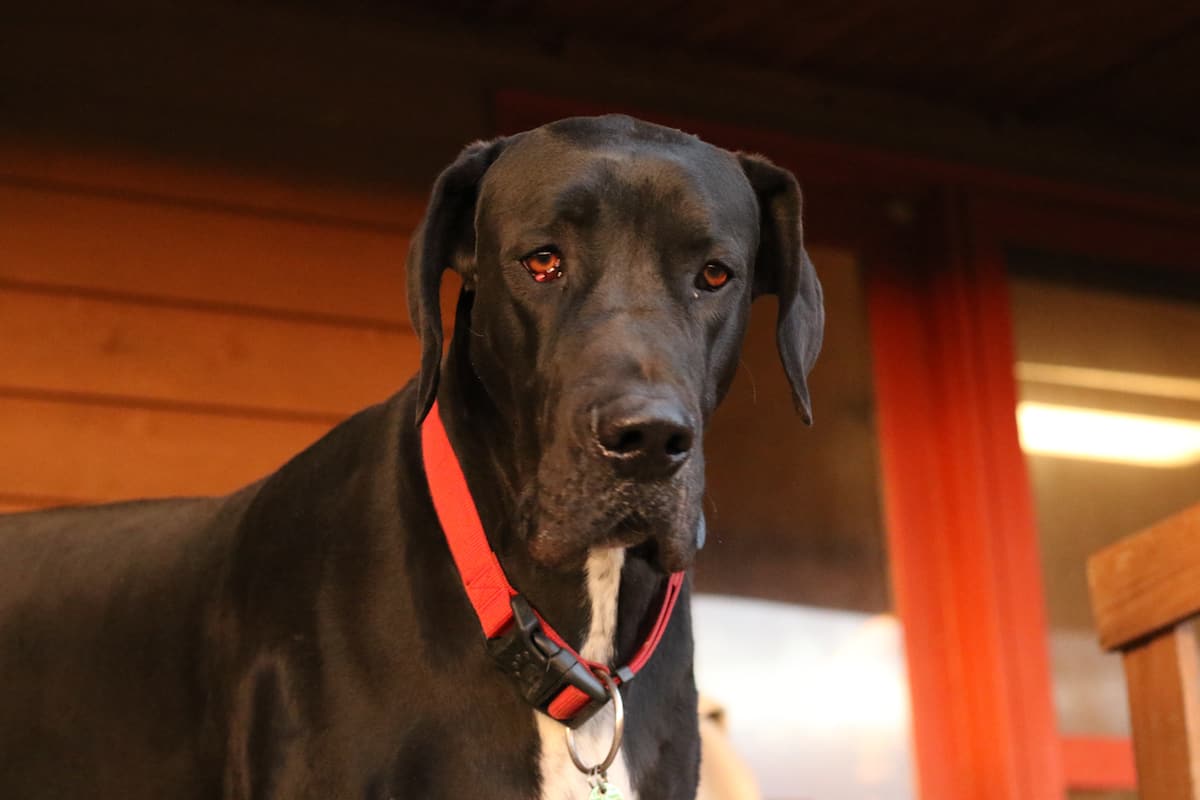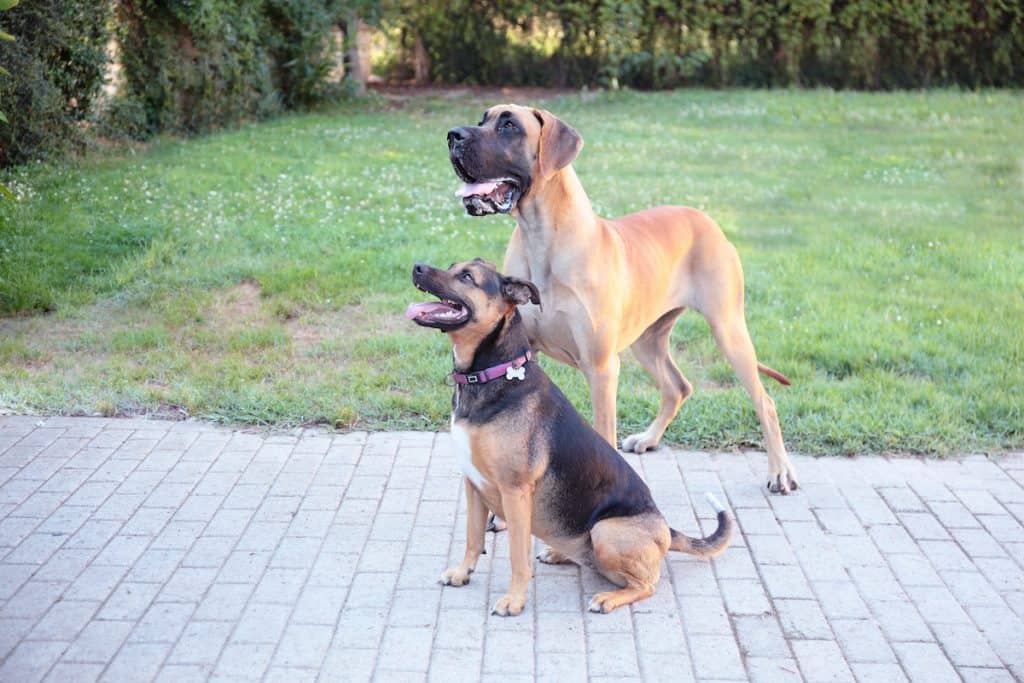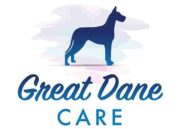
They’re large, they’re affectionate, and they’re sometimes pretty slobbery: they’re Great Danes, and even though they’re a lovable family pet, they may be the reason you can’t get approved for a rental apartment or house.
Great Danes are one of the most commonly restricted breeds in apartment complexes, rental houses, and other rentals. This is due to legislation, insurance companies, and rental company policies. However, exceptions do exist, and Great Dane owners should ask if their dog will be allowed to live there.
To help you understand everything surrounding Great Danes being a restricted breed, we’ll walk you through why Great Danes are commonly restricted and what you can do if you and your dog are facing restrictions.
Great Danes and Breed Restrictions
You or someone you know may have experienced this scenario before: you decide it’s time to move. You go through the process of choosing an area, researching all your housing options, going to showings, and putting in applications.
Then you hear back on your application and see that it was denied – because of your dog!
It’s a common scenario, and it doesn’t just apply to Pitbull or Husky owners. Great Dane owners are often faced with this scenario too.
Unfortunately, when it comes to breed restrictions, Great Danes are one of the most commonly restricted breeds.
Why Are Great Danes a Restricted Breed?

Great Danes are one of the most commonly restricted breeds – but why?
It comes down to three main entities that enforce breed restrictions:
- Legislation
- Landlord/Property Management Discretion
- Insurance Companies
Restriction #1 – Legislation
Great Danes may be restricted due to the laws of a city, county, or state.
Certain cities, counties, and states may have specific legislation that bans certain breeds in certain ways. In most instances, the law bars Great Danes from being in types of housing.
However, some legislation may go so far as to ban Great Danes from entering the city, county, or state limits. Great Dane owners should always check their area’s legislation and ordinances.
If you want to explore the legal aspects of this in great detail, check out this article by the Animal Law Center.
The bad news about this type of restriction is really sets the standard for everyone else to follow. No matter how accommodating or friendly your landlord it towards Great Danes, they’re still bound by law.
Restriction #2 – Landlord / Property Management Discretion
Two of the most common entities that restrict Great Danes are landlords and property management companies.
Both landlords and property management companies can and do restrict Great Danes from residing in their homes, apartments, or other buildings. Landlords and property management companies can often choose to restrict specific dog breeds at their discretion.
However, policies and restrictions differ among landlords and property management companies.
Because there are literally thousands of these companies across the United States alone, your best bet here will be to check with other local owners to find a shortlist of Dane-friendly providers.
Even if you don’t know other Great Dane owners local to you, make use of Facebook groups and other social networks to start sourcing this information.
Restriction #3 – Insurance Companies
Most policies and restrictions enacted by landlords or property management companies are due to the third entity that restricts Great Danes: insurance companies.
Simply put, most insurance companies (especially insurance companies that have to do with housing and renting) have breed “blacklists.” Great Danes are commonly on these lists.
In order for landlords or property management companies to be covered under insurance policies, they have to abide by the insurance company’s rules.
Therefore, if an insurance company used by a landlord restricts Great Danes, the landlord has to restrict Great Danes as well to keep their insurance policies.
Why Insurance Companies Commonly Restrict Great Danes
Sure, Great Danes are big dogs, but they’re usually gentle giants. Why do insurance companies commonly restrict them? There are a few main reasons why.
According to the article “14 Dog Breeds Restricted by Insurance Companies” in Psychology Today, Great Danes are commonly restricted by insurance companies because of the risks and dangers they can pose to others.
Psychology Today explains that dog-bite related claims significantly affect the insurance industry, and even bring about a financial burden to the industry.
In 2013 alone, roughly $490 million was paid out by homeowners’ insurance liability claims for those who suffered dog bites.
Because costs of dog bite claims are so high and so common, insurance companies often altogether refuse to insure breeds that they consider “high risk.”
While there are no specific criteria for a dog breed to be considered “high risk” and be put on an insurance company’s breed “blacklist,” dogs that have a history of being dangerous and dogs that can do a lot of damage with a bite are commonly added to the “blacklists.”
Each insurance company comes up with its own breed “blacklist,” and these lists vary from company to company.
However, Great Danes commonly appear on them. Stanley Coren, the author of “14 Dog Breeds Restricted by Insurance Companies” found Great Danes mentioned on almost every single insurance company breed “blacklist” he researched.
Well it may not make you feel any better, at least Great Danes aren’t alone in this regards…
Other breeds that are considered “high risk” like Great Danes are Rottweilers, Cane Corsos, German Shepherds, Wolf-hybrids, Siberian Huskies, and Doberman Pinschers.
Can I Do Anything If My Great Dane is Restricted?
If you’ve found out that your Great Dane is a restricted breed in the area or housing in which you are trying to live, you’re probably wondering if there’s anything you can do about it…
Because of animal activists and because of evolving circumstances, breed-specific restrictions have been slowly changing and even decreasing. Many areas and housing types are becoming more comfortable with fewer breed restrictions.
However, if you’ve found out that your Great Dane is still restricted, there are absolutely some things you can do!
Things to Do If Your Great Dane is Restricted

If your Great Dane is restricted from the area or housing you want to move into, all hope isn’t lost.
Let’s look at some additional actions you can take if your Great Dane is restricted by one of the entities mentioned above.
Option #1 – Request a “Pet Interview”
The article “Breed Restrictions 101” suggests that Great Dane owners can request a “pet interview” with the landlord, property management company, or other entity responsible for restriction.
Pet interviews will be one of the best courses of action when breed restrictions are put in place by a landlord or a property management themselves, rather than an insurance company they work with.
To ask for a pet interview, simply call, email, or ask in person if the landlord or property manager is willing to meet with you and your Great Dane.
The idea is for your landlord or property manager to become acquainted with your dog and his temperament and personality.
If your request for a pet interview is accepted, follow these tips to make sure it goes successfully:
- If the property has a designated dog area or a public area, request to have the interview there. That way, you can demonstrate that your Great Dane gets along well with other dogs and people and doesn’t pose any risks.
- Talk about your previous renting experiences and your past living situations and explain how your Great Dane behaved. Explain how you handle him with your living situations.
- Bring along your Great Dane’s current veterinary records to show that he is up to date on all vaccinations and shots.
Option #2 – Gather References
Even if you don’t get a pet interview with your Great Dane and landlord or property manager, it still doesn’t hurt to gather references for your dog.
Think of other dog owners and other people you know that can vouch for your Great Dane.
You can get written accounts from your references about your Great Dane’s behavior and personality, or you can provide the landlord or property manager with the names and contact information of your references so they can contact them themselves.
The best case scenario here is to actually put them in touch with any former landlords that would vouch for you.
Bottom Line
Even though Great Danes are lovable pets and great additions to the family, they’re unfortunately a commonly restricted breed among landlords, property management companies, and legislations.
There are still some things Great Danes can do in the event their dog is restricted from where they want to reside. Remember, if you don’t ask or take other actions, the answer may always be no.
So, don’t give up hope – you may still be able to get your Great Dane approved and able to live exactly where you want to!
Speaking of insurance, as a Great Dane owner you should highly consider looking into pet insurance. Unexpected medical costs can quickly escalate with a giant breed, and it’s not something that you want to be caught off guard looking for. Take a look at my full article on Great Dane pet insurance here.
